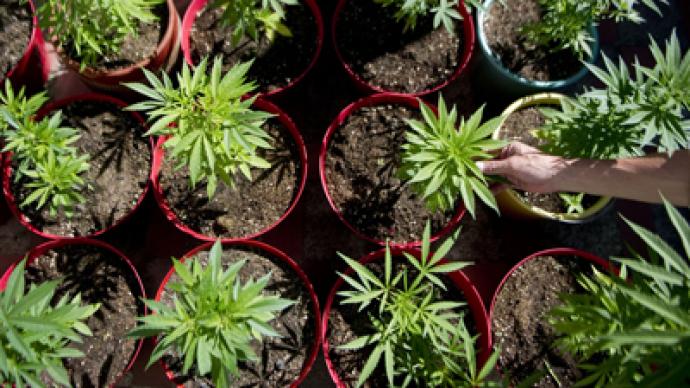Obama administration considering ways to overturn marijuana legalization in Washington and Colorado

New legislation in Washington state went into effect this week that legalizes for the first time in ages the possession of marijuana. Federal law still says otherwise, though, setting up the Justice Department to make some serious determinations.
Even as smoking up became protected by state law in Washington starting Thursday, coast-to-coast prohibition as provided by a long-standing federal ruling remains on the books. For marijuana advocates in the Pacific Northwest, the lifting of the ban is a pretty big victory. That doesn’t mean that the Justice Department has ruled out an intervention, though.Since voters in Washington and Colorado opted on Election Day to legalize small amounts of marijuana for recreational use, the Department of Justice has been relatively quiet over how it will handle what is likely to become a heated debate regarding states’ rights. In an article published by The New York Times this week, reporter Charlie Savage says senior White House and Justice Department officials are already attempting to tackle how to handle the new marijuana laws, and are amid deliberations right now that will determine when, where and how national law enforcement can intervene.Savage cites anonymous sources familiar with the discussions in DC, whom he says are considering plans for legal action against the states of Colorado and Washington. Meanwhile this week the Obama administration once again chimed in on the topic, but as with earlier abbreviated statements, the only words out of the nation’s capital forecast an ominous battle likely to brew for some time.When the results of the legislations up for vote in both states trickled through on the evening of Election Day, the Justice Department dispatched a short statement clarifying the federal classification of marijuana as an illegal substance. This week, the United States attorney for Seattle, WA once again warned that federal law is still on the books.“In enacting the Controlled Substances Act, Congress determined that marijuana is a Schedule I controlled substance,” state attorney Jenny A. Durkan announced in a statement. “Regardless of any changes in state law, including the change that will go into effect on December 6 in Washington State, growing, selling or possessing any amount of marijuana remains illegal under federal law.”Additionally, the New York Times quotes Durkan as saying the Justice Department maintains that its "responsibility to enforce the Controlled Substances Act remains unchanged," meaning federal law enforcement isn’t necessarily interested in adhering to local rules.A similar legislation approved during last month’s Election Day is expected to go on the books in Colorado in the coming weeks. Even before becoming official, however, some important state institutions have announced that they won’t be cooperating with the end of prohibition."In order not to lose federal funds, we need to comply with federal law," University of Colorado at Boulder spokeswoman Malinda Hiller-Huey told The Denver Post.Speaking to NBC, Colorado Governor John Hickenlooper acknowledged even before the new law was approved that it would be an uphill battle for local marijuana advocates given the feds’ insistence in playing by their own rules."It's probably going to pass, but it's still illegal on a federal basis. If we can't make it legal here because of federal laws, we certainly want to decriminalize it,” he said.Seattle City Attorney Pete Holmes tells NPR station KUOW that in his state, residents should be thankful that local law enforcement won’t be tasked with what is largely considered not just a non-issue, but an expensive endeavor. Whereas schools and universities in Colorado aren’t considering the new law for the sake of saving money, Holmes says the legislation in Washington will actually save the state bundles."I think that they should acknowledge this newfound right," he says to KUOW. "I think they should celebrate in the privacy of their homes if they choose to do so. And be thankful that we’re no longer arresting some 10,000 Washingtonians a year in the state of Washington and spending well over $100 million in law enforcement resources on that."Meanwhile, more liberal minded lawmakers in the District are hoping to iron out a way to ensure that state laws are protected before federal agents can have their way. Rep. Diana DeGette (D-Colorado) introduced a bipartisan legislation before Congress that will amend the US Controlled Substances Act to provide that federal law shall not preempt state marijuana laws."I am proud to join with colleagues from both sides of the aisle on the 'Respect States' and Citizens' Rights Act' to protect states' rights and immediately resolve any conflict with the federal government," Rep. DeGette said upon introducing House Bill 6606. "In Colorado we've witnessed the aggressive policies of the federal government in their treatment of legal medicinal marijuana providers. My constituents have spoken and I don't want the federal government denying money to Colorado or taking other punitive steps that would undermine the will of our citizens."According to a recent survey conducted by Public Policy Polling, nearly six out of ten Americans want marijuana legalization on a widespread scale. In a separate Angus Reid Public Opinion poll published last week, over 60 percent of Americans surveyed said they expect marijuana to be federally permitted within the next decade.














